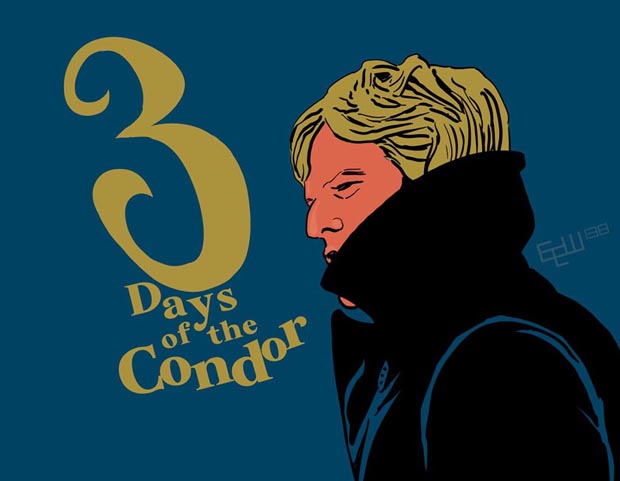Reviews of Classic Film, with artwork and news
LAST UPDATE December 10, 2025
Fast Review
Grand Exit - 1935: It sure is nice to be wanted, which is the premise of this film when Thomas Ignatius 'Tom' Fletcher (Edmund Lowe), an arson investigator, is desperately asked to return to employment at Interoceanic Fire Insurance Company. The place that had laid him off in the past because he had approved payouts on expensive properties that had burned, and he was blamed for not finding some mitigating circumstance to save the company money. But now the situation has changed, and Interoceanic has reached desperate straits because they've racked up over a million dollars in losses from payouts on six recently burned buildings that were apparently all hit by the same fire bug. Now they can't just ask Fletcher to come back, they've got to woo him to do it.
If this situation reminds you of how The New York Evening Star pursued William Powell (as 'Bill' Chandler) to get back on their payroll as a scandal investigator in the 1936 Libeled Lady, it's because it looks like almost the same prelude, though the later Libeled Lady is a pure screwball comedy (and probably one of the best made in the1930s), and Grand Exit is not at all. This film does have another connection to William Powell: it comes across in flavor as a bit of a knock-off of the 1934 The Thin Man.
Edmund Lowe gives his arson detective a very deep vein of humor to draw from, though, and the deal he demands out of Interoceanic is comical: besides the monetary remuneration, he picks out secretaries by their looks and wants them changed out daily; he wants a stocked electric refrigerator with cold beer in his office, etc. Later in the film when he has pursued but failed to track down the arsonist and his reputation is suffering (in fact that's how the character describes a particularly tall, burning building on fire: that's my reputation going up in smoke), we know what Interoceanic is thinking because they've cut him off from the beautiful, blonde string of secretaries he was seeing every day and is instead given the taciturn (and memorably physically structured) Nora Cecil as the very no-nonsense Miss Appleby.
But, gee, why is Ann Sothern (as Adrienne Martin aka Adeline Maxwell) always snooping around the burned buildings, and in some cases showing up right as they begin to fry? And isn't Onslow Stevens (as Interoceanic's other arson investigator John Grayson) perhaps bitter about being made #2 to the fast-talking, laughing Tom Fletcher? Grand Exit does a nice job of spreading paranoid suspicion around the cast, and Interoceanic's executives are continually murmuring to each other maybe Fletcher is burning the buildings himself just to get his job back or in revenge at Interoceanic's for firing in the first place.
Director Erle C. Kenton and script writers Bruce Manning, Lionel Houser, Gene Towne and C. Graham Baker keep Grand Exit exit moving forward, and though this is not a screwball comedy, it has solid comedy underpinnings whenever Ann Sothern and Edmund Lowe are together on screen and dueling with snappy, snarky language. Peppery wordplay was a particularly grandiloquent feature of many 1930s movies, apparently mastering the use of recorded sound on film after decades of silent movies tapped into a mother lode of dialogue that needed airing, and everyone seemed to talk a faster and to certainly have a lot more fun with language in that era. Grand Exit is a fine example of this, though it is a film that belongs in that vague Hollywood genre of professional men doing dangerous things, in this case we get a lot of footage of real burning buildings and this certainly gets across the idea that an arsonist is someone who is practicing a lateral profession just a few steps away from mass murder.
Lowe and Sothern are very good, though Lowe is certainly the dominant character and Sothern isn't given enough of the sort of ironic lines she was so good at in later films. We do start to wonder what's going on as she seems to be more and more involved with, mysteriously, with the question of who exactly is burning all these buildings down.
Interoceanic's offices provide a mostly funny gallery of executives who can't resist making the wrong decisions in order to save a nickel though they're risking millions in the process. We do get a dignified and serious Edward Van Sloan (better known as the Van Helsing that faced down Lugosi's Dracula a few years earlier) as a level-headed insurance executive who can see through the blather of his fellow directors at Interoceanic, and can see through Lowe's character's blather, too, knowing this is the guy they need to stop the carnage, no matter how ridiculous Fletcher makes the terms.
Laurel and Hardy - The Restored Features, Volume 1 released – Classicflix
Pardon Us (1931) and Pack Up Your Troubles (1932)
BONUS FEATURES: Opening title sequence of the preview version of Pardon Us (which had the working title of Their First Mistake) featuring the "talking titles" with the Crane twins; Never-before-seen alternate ending for Pardon Us (no audio); Pardon Us alternate audio track without incidental music
Review
Miracle on 34th Street (1947) – If you're willing to believe in Santa Clause, this film has a story for you. And if you're not? Well, it's got an angle on that, too.
Maureen O'Hara plays Doris Walker, a senior manager at the huge Macy's department store in New York City. She's a single parent with a young daughter (played by 8 year old Natalie Wood) who, as the Macy's annual Christmas parade begins to assemble for the march through NYC, she suddenly needs to replace their very inebriated Santa Clause for the store's float. An unhappy Edmund Gwen is right there with her because he has already complained to the Macy's employees that their Santa was drunk and "a disgrace." Doris takes one look at Gwen's nicely groomed white beard and impish, elfish face and makes a panicked offer: will you replace our drunken Santa? Gwen is delighted to put on the suit.
What seems like a happy miracle of coincidence soon becomes complicated. This new Santa has not only made a good impression on the crowds in the streets, but after he is asked to play their store Santa inside the sprawling empire of the multi-story Macy's department store, long lines of kids and parents find this old gentleman a perfect incarnation of Kris Kringle. What's the problem? Maureen O'Hara's character discovers their new Santa Clause thinks he is Kris Kringle.
Fearing she might have a madman on her hands, Doris investigates and learns that Kris comes from an asylum that took care of old people. The institution's physician (James Seay) assures them, Kris's delusion is harmless and is only an expression of his desire to be helpful and kind. Maureen's character is afraid of what might happen if the delusion is challenged, but she's also afraid of what will happen if they try to replace this very popular Santa Clause. The solution is to just keep a close eye on him, and in the scheme to do so, she arranges for Kris to come live downtown at the home of senior store manager Julian Shellhammer (Philip Tonge), but before this gets accomplished Kris has already been offered a place at the home of Doris's earnest, want-to-be boyfriend Fred Gailey (John Payne) who lives in Doris Walker's own apartment building.
Now, not only is Kris at the store, but he's just a few doors away when off-duty. He is soon spending time with Doris' daughter and Kris learns little Susan Walker is being raised with a parental attitude of complete honesty at all times and the complete exclusion of any forms of phantasy. Kris begins amending this by teaching Susan how to imagine being an animal from the zoo, for example, a monkey, such as comically scratching and saying "ook, ook" as they pretend to drag around their extra-long arms.
Meanwhile, Fred Gailey is trying to overcome the refusal of the mother to respond to his amorous interest, and with a little prodding discovers a rich vein of bitterness from the past that hints at a painful and traumatic experience about Doris's daughter's father. Now that he knows what he is up against, a cheerful Fred gets to work, and with Kris teaching the daughter how to be a kid, the pair each have clear cut missions in mind. But then a major problem develops at the store involving the official psychiatrist at Macy's who takes a very dim view of this Santa Clause delusion...
A sharp script (by George Seaton and Valentine Davies) sometimes has enough Frank Capra-Robert Riskin flavor to it to make you wonder if that pair ghosted some of the story. There's also a reworked A Christmas Carole flowing around the character of the angry and wounded Doris Walker who needs a little help toward redeeming her future. Kris isn't a time-shifting angel like the spirits in the Dicken's tale, but when his certainty that he is Santa Clause blossoms into a court case hearing in which he could be "put away" at Bellevue, Doris has got to choose which side she is on. Erstwhile boyfriend Fred, who fortunately is an attorney, only see's one way out of the mess and that's to prove Kris really is Santa Clause.
Miracle on 34th Street has long been a staple of holiday TV programming, and the care taken in making the film reflects the access the production had to actual Macy's stores, but the original packaging of the movie didn't emphasize Christmas at all. The parade scenes were actual real parades (sometimes filmed using hidden cameras) that the production recorded during the 1946 Christmas season. Natalie Wood later said she thought Ed Gwenn's Santa Clause (he grew his beard out for the role) was "the real Santa" during filming.
Despite the obvious seasonal nature of the story, head of Twentieth Century Fox, Darryl Zanuck, was convinced the film would do better with a May-June release, so this quintessential December movie was actually put into theaters in early summer. Zanuck was certain the relatively low cost on the movie had more potential for box office in the months when attendance at theatres was highest, and it paid off: the earnings were four times production cost. Marketing at the time down played the Christmas connection and played up the Maureen O'Hara - John Payne romance, and Ed Gwenn was miniaturized on the posters.
Miracle on 34th Street went on to get three Oscars: Best Supporting Actor for Ed Gwenn; Best Screenplay and Best Original Story wins for the film's director George Seaton.
The Criterion Feb 2026 releases on disk
Network 1976 - 4K and Blu Ray HD disks. Directed by Sidney Lumet "from a brilliantly incisive script by Paddy Chayefsky" - Criterion Page
Lubitsch Musicals 4-film box set – The Love Parade (1929) with Maurice Chevalier and Jeanette MacDonald; Monte Carlo (1930) with Jeanette MacDonald; The Smiling Lieutenant (1931) with Maurice Chevalier, Claudette Colbert and Miriam Hopkins; One Hour with You (1932) With Maurice Chevalier and Jeanette MacDonald. 2 Disk Blu Ray set. - Criterion page
3:10 to Yuma 1957 - 4K, Blu Ray and DVD. Classic western from a story by Elmore Leonard. Starring Glenn Ford and Van Heflin. Criterion Page
Captain Blood 1935 - 4K, Blu Ray and DVD. Erroll Flynn stars with a "groundbreaking symphonic score by Erich Wolfgang Korngold." – Criterion Page

Review
Review:
Island of Desire – 1951: A flawed movie with very nice color photography and an occasional witty moment from the script:
Linda Darnell: Dugan, I really wanted to help, but I was terrified. You've never been afraid, have you?
Tab Hunter: Sister, the only thing that scares the tar out of me is you.
An island melodrama somewhat in the vein of The Blue Lagoon featuring Tab Hunter as a U.S. marine and Linda Darnell a skilled veteran combat nurse who get marooned together in the South Pacific. More about Island of Desire, 1951
Review:
Road to Morocco – 1942: On the road again with Bob Hope, Dorothy Lamour and Bing Crosby trying to handle a sand-and-sandals tale which won't stay within the lines of an "exotic adventure" from Hollywood but keeps stopping to let the performers, especially Bob Hope, to talk to the audience directly. Often considered the best of the seven "Road" pictures made by the trio, the film also features Anthony Quinn and Dona Drake - more about Road to Morocco – 1942
Review:
Actors and Sin – 1952: This mini-anthology diptych written, directed and produced by Ben Hecht is about the business-end of the acting and the producing arts, two tales split in opposite extremes, each like the ancient "Thalia and Melpomene" masks of drama in which one is laughing and the other is crying, something that pictures the two stories Hecht has put together here. "a lovely piece of old-fashioned mummery."
More about Actors and Sin, 1952
Criterion classic film releases just ahead
1930 Hell's Angels with Jean Harlow - 4K release – Criterion Coming November 18
1940 His Girl Friday in 4K with Rosiland Russell and Cary Grant – Criterion Coming December 2
4K Captain Blood with Erroll Flynn – Criterion Coming January 20, 2026
The "living Caryatid" Irene Papas
The "living Caryatid" Irene Papas film retrospective at the Greek Film Archive in Athens
Story at Lifo [in Greek - English vis Google Translate]
Review:
Ladies Man – 1931: Early "talkie" with a primitive handling of audio and especially the pacing of dialogue but Carol Lombard, kay Francis and a youngish William Powell make it work toward the tragic ending. More about Ladies Man, 1931
Review:
Funny Girl – 1968: This film is half of a very, very good musical about early 20th century songstress and comedienne Fanny Brice with Omar Sharif and Barbra Striesand – more about Funny Girl.

Claudia Cardinale has died - 1938–2025
"Acclaimed Italian actor Claudia Cardinale, who starred in some of the most celebrated European films of the 1960s and 1970s, has died, AFP reported Tuesday. She was 87." – Associated Press - New York Post
"Claudia Cardinale, star of ‘8½’ and ‘The Leopard,’ dies at 87" – MSN CNN News
"The rebellious diva of Italian cinema" – La Repubblica [Italian]
From her first film Big Deal on Madonna Street by Mario Monicelli to her latest works with young directors, Claudia Cardinale made more than 150 films. Thus, ‘the girl who didn’t want to go into cinema’ became an icon of Italian identity thanks to collaborations with the greatest Italian directors, from Visconti to Fellini, from Comencini to Ferreri, from Leone to Blake Edwards. She also worked for Hollywood, though she fled from it. The list of awards is long as well: from the David di Donatello prizes for Girl with a Suitcase by Valerio Zurlini and The Day of the Owl by Damiano Damiani to the Silver Ribbons, from the Golden Bear for Lifetime Achievement at the Berlin Festival in 2002 to the Golden Lion for Lifetime Achievement at the Venice Festival in 1993..."
"A symbol of Mediterranean beauty and a beloved actress for directors such as Visconti, Fellini, Leone, and Herzog" – La Stampa [Italian]
Review:
There's Always A Woman - 1938: Melvyn Douglas and Joan Blondell are a husband-wife team working from opposite sides on a murder mystery - More about There's Always A Woman

Robert Redford has died - 1936–2025
"Elusive legend of the big screen" – UK The Times
When the success of Butch Cassidy and the Sundance Kid elevated him from promising leading man to bona fide movie star status, Robert Redford did not celebrate. Rather, he sat down and wrote a list of the three key danger points of his newly minted celebrity.... It was a curiously wary response from an actor who had spent the film shoot terrifying the rest of the cast and crew by insisting that he did his own stunts ... Physically daring but intellectually cautious, he was deeply suspicious of Hollywood and its trappings, by nature distrustful of movie industry exuberance. He was — crucially — a very private person, who kept even his closest collaborators at arm’s length. The screenwriter William Goldman recalled that even on their third film together, All the President’s Men, Redford was still too cagey to give out his home phone number."
A movie star and founder of Sundance – Washington Post
Mr. Redford remained essentially a loner who craved the solitude of his wilderness home in Utah and pushed 120 mph on the open highway in his Porsche..."
Virginia USA based Elder Care for bill payment, case management, prescriptions, tax records or support for caregivers - AllStar Care Solutions
Belief-Code, Body Code and T3 Therapy? See sacred-connection.com


